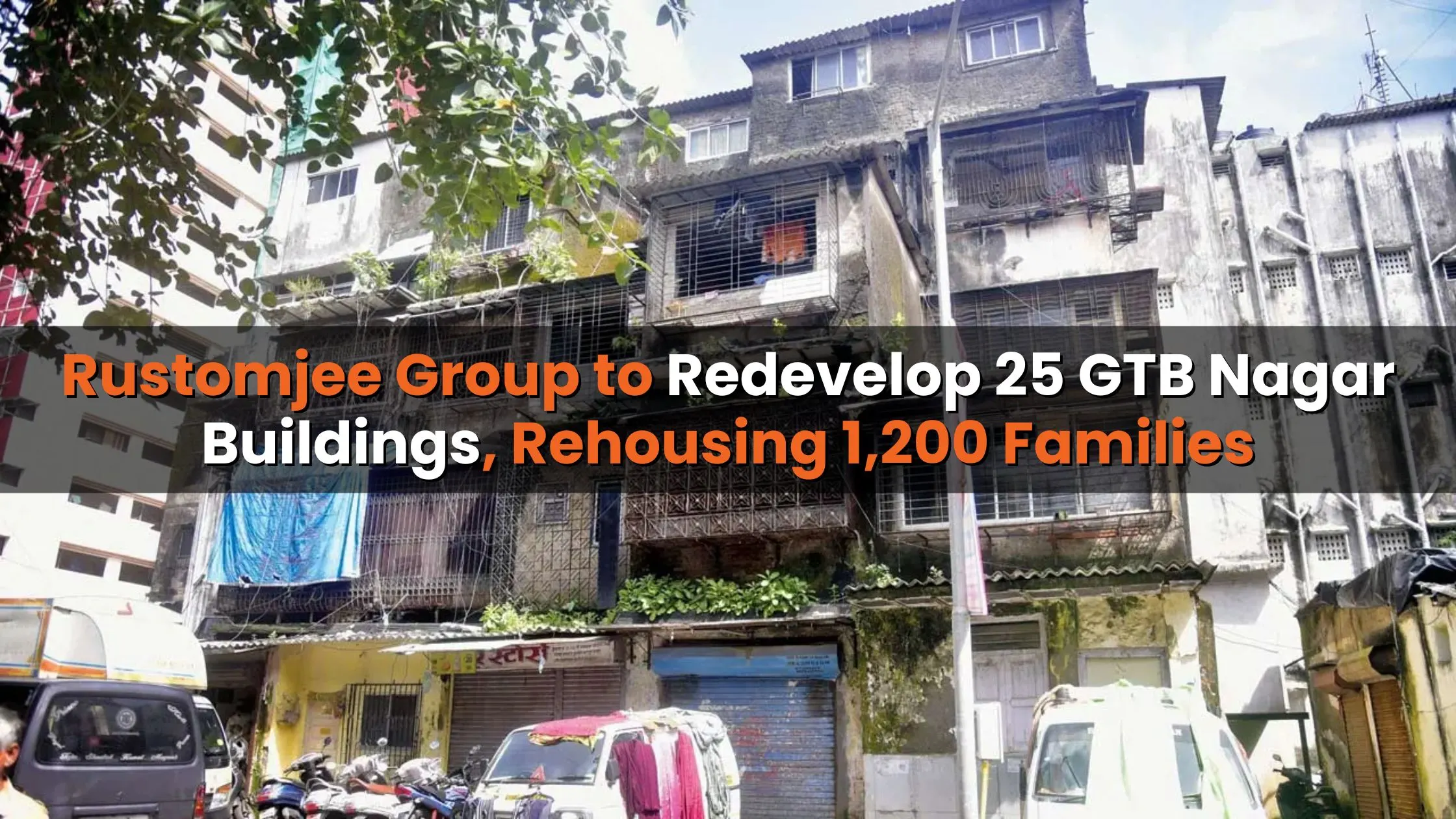Table of Content
▲
The Maharashtra Housing and Area Development Authority (MHADA) has initiated a groundbreaking redevelopment project in Mumbai's Guru Teg Bahadur (GTB) Nagar, Sion Koliwada. This initiative will be carried out by the Rustomjee Group, which has been entrusted with the redevelopment of 25 buildings, providing a new lease of life to over 1,200 Sindhi families. These families, who migrated to India post-Partition, will soon receive modern, safe homes as part of this ambitious project.
A Historic Initiative
The redevelopment spans 11.20 acres and aims to replace the dilapidated buildings that once housed Sindhi refugee families. Each family will receive a 635 sq. ft. apartment, free of cost, in exchange for their current unsafe homes. The project also includes the creation of 25,700 square meters of housing stock for MHADA, utilizing a permissible Floor Space Index (FSI) of 4.5, including the fungible area.
This redevelopment holds a unique distinction as it marks the first project executed by MHADA on privately owned land, setting a precedent for future urban renewal efforts.
Also Read: Mumbai Property Registrations Reach 11,521 in June, Marking a 1% YoY Decrease
The Role of Rustomjee Group
Rustomjee Group has been selected for its expertise in large-scale construction and redevelopment. MHADA's Vice President and CEO, Sanjeev Jaiswal, handed over the Letter of Intent (LOI) to the group, signaling the start of this transformative venture.
Jaiswal emphasized that the redevelopment must prioritize the 1,200 affected families, ensuring their rehabilitation is completed without delay. He also highlighted the importance of creating a comprehensive master plan, which will be closely monitored to maintain the project's progress and quality.
The Legacy of Sindhi Refugees in GTB Nagar
The Sindhi families residing in these buildings have a poignant history. Post-Partition, over 1,200 families were settled in the area under the Displaced Persons (Compensation and Rehabilitation) Act, 1954. The government constructed 25 buildings specifically for these refugees, offering them affordable housing at just ₹5,380 per unit. Payments were facilitated in installments to make homeownership feasible.
Over the decades, these homes became a symbol of resilience and community for Sindhi refugees, many of whom had fled from Sindh and Punjab provinces of Pakistan. Today, property rates in the locality range from ₹20,000 to ₹30,000 per sq. ft., a testament to its growth and urban value.
Addressing Safety Concerns
The need for redevelopment became urgent in 2020 when the Brihanmumbai Municipal Corporation (BMC) declared the existing buildings unsafe and demolished them. Residents were forced to find alternative accommodations, adding to their challenges. Recognizing the plight of these families, the Maharashtra government approved the site's redevelopment through MHADA, despite its private ownership.
A Model for Future Redevelopment
This project sets a historic benchmark as MHADA’s first redevelopment initiative on privately owned land. With the potential to transform urban housing strategies, it underscores the importance of balancing modern infrastructure development with historical and cultural preservation.
Jaiswal described the project as a model initiative, showcasing how government agencies and private developers can collaborate to deliver impactful solutions. The project’s success could inspire similar endeavors across Mumbai, addressing the city’s pressing housing and safety concerns.
Also Read: Over 70,000 Housing Units Stalled in MMR Due to Green Clearance Hurdle
Conclusion
The appointment of the Rustomjee Group by MHADA to redevelop GTB Nagar is more than just a construction project—it’s a step towards restoring dignity and security to 1,200 families with a rich legacy. By providing safe and modern housing, the initiative not only addresses critical safety concerns but also reaffirms the importance of preserving historical communities within the framework of urban progress.
As Mumbai continues to grow and evolve, projects like this highlight the city’s commitment to inclusive development, ensuring that no community is left behind in the quest for a modern and safe urban landscape.
Follow AquireAcers Whatsapp Channel to Stay Updated With The Latest Real Estate News






_1771582392.webp)
_1771577585.webp)
Ans 1. The Maharashtra Housing and Area Development Authority (MHADA) has initiated a redevelopment project in GTB Nagar, Sion Koliwada, to rebuild 25 buildings. This initiative will rehouse over 1,200 Sindhi families who were originally settled in the area post-Partition.
Ans 2. The redevelopment project is being managed by the Rustomjee Group, selected for their expertise in large-scale construction and redevelopment. MHADA is overseeing the project to ensure quality and timely completion.
Ans 3. Each affected family will be provided a 635 sq. ft. apartment free of cost, replacing their current unsafe homes. Additionally, MHADA will create 25,700 square meters of housing stock as part of the project.
Ans 4. In 2020, the Brihanmumbai Municipal Corporation (BMC) declared the existing buildings unsafe. To address safety concerns and provide better living conditions, the Maharashtra government approved the redevelopment.
Ans 5. The buildings housed Sindhi refugee families who migrated to India after Partition in 1947. Constructed under the Displaced Persons (Compensation and Rehabilitation) Act of 1954, they symbolized resilience and community for the displaced Sindhi population.
Ans 6. This is MHADA’s first redevelopment project on privately owned land, setting a precedent for similar collaborations in the future. It demonstrates how public agencies and private developers can work together for urban renewal.
Ans 7. The redevelopment is expected to enhance property values in GTB Nagar, where rates already range between ₹20,000 and ₹30,000 per sq. ft. Improved infrastructure and modern housing will further boost the area’s real estate appeal.
Ans 8. Residents have faced displacement since 2020, as the unsafe buildings were demolished. However, the redevelopment aims to mitigate these challenges by providing safe and modern homes.
Ans 9. The redevelopment addresses critical housing and safety concerns, providing a model for future urban renewal projects. It balances modern infrastructure needs with historical preservation, contributing to Mumbai’s inclusive growth.
Ans 10. Although an exact timeline hasn’t been provided, MHADA has emphasized the importance of timely rehabilitation for the affected families. The Rustomjee Group is expected to work closely with MHADA to ensure efficient progress.